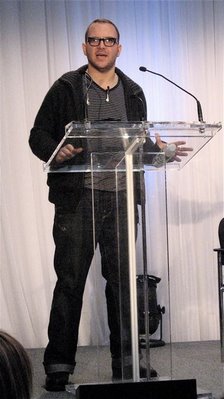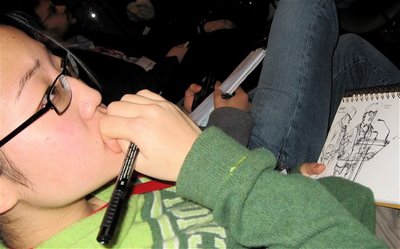Friday, January 26, 2007
Whole bunch more great speakers at F2C: Freedom to Connect
The agenda for F2C is starting to gain some detail and shape too.
Technorati Tags: Conferences, F2C, F2C2007
Ai Wei Wei at DLD
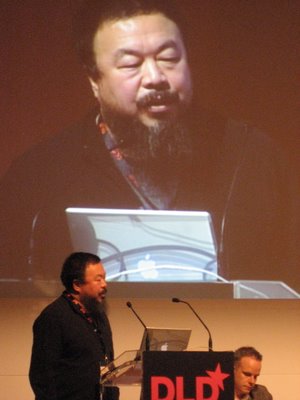
DLD was an altogether amazing conference in Munich last week. I don't even know where to begin . . . it is an experience that will take months to assimilate. Ai Wei Wei stood at the podium on the last day mumbling in Chinese, while a successive translator tried to capture the gist in English. He showed amazing pictures of his projects -- note: wait for this link, it is coming from Godknowswhere.cn . It was a revelation that China supports such creative giants as Ai Wei Wei.
Technorati Tags: China, Conferences, DLD, DLD2007
Siva Vaidhyanathan at Google Unbound

One of the best things about Google Unbound is that I finally got to meet Siva Vaidhyanathan. I can't believe I never met him before.
Doctorow by Kang
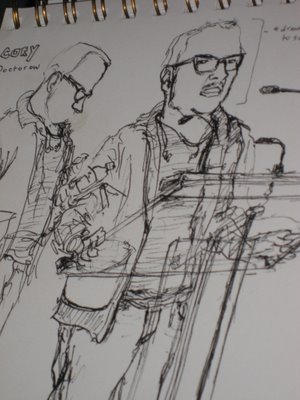
I wanted to publish this picture of Cory Doctorow by Dawn Kang last week when Blogger and Earthlink were, ahem, interacting.
Cable TV problem fixed

The outdoor splitter leaked and water got into the wire, requiring a whole new drop. It was an expensive truck roll for Cablevision. The cable guy said they use waterproof splitters now. Good, but waterproof wire (fiber) would be better.
The centralization-is-good gang has been getting on my case in comments on this post. "Jonathan," for example, says, " . . . how much of YOUR time and effort were used in fixing your TV compared to your blog? . . . wouldn't have been an issue for you if you knew the founders of Comcast and Sony."
Well, the first fact to consider is I don't care NEAR as much about my TV service. It wouldn't have risen to "bloggable" except in juxtaposition with the Earthlink/Blogger problem. I don't use TV to express myself, so it's not that important. If I had cared at the same level, YOU BETCHA I'd have been hanging on the phone for hours . . .
Second, I didn't have a choice of cable providers. (Well, not exactly true, I can choose Cablevision or satellite, and soon maybe FIOS.) But I live in a Cablevision neighborhood, and even though I absolutely do know senior management at a couple of the other cablecos, I couldn't get my service from Comcast or TWC or Charter if I wanted. The reason, AND THIS IS IMPORTANT, the reason I was able to choose Earthlink as my host in the first place (instead of Verizon or Cablevision), and Blogger as my application, is that there's a tradition on the Internet that the owner of the facility can't discriminate against (or in favor of, which is the same thing) what I connect to using that facility. This tradition used to be backed by law (common law, statute and regulation) but now the law is eroding under the firehose of wannabe robber-barron corporatistas.
Third, YOU'RE RIGHT that maintenance -- and reliability, and other formerly centralized functions -- are much more in the hands of the user than they were in The Intelligent Network. I've been saying that for years, see my "Lost" Business Communications Review article, Buy as Many Nines as You Need. But (a) the added management is a small price to pay for the vast innovative potential The Stupid Network affords, and (b) it is offset by the dramatically simplified lower layers of the Stupid Network -- imagine a computer literate junior high schooler installing ATM/Sonet or 3G the way they install Ethernet and Wi-Fi.
Anyhow, the cable is fixed. Ho hum. Back to work.
Technorati Tags: Blogger, Cableco, Earthlink, NetworkNeutrality
Vermont Governor Jim Douglas at F2C: Freedom to Connect!
Noted telecom exec, blogger and activist Tom Evslin, a Vermont citizen, will introduce the Governor. [See Evslin's e-State post here.]
Technorati Tags: F2C, F2C2007, TomEvslin, UniversalService
Bruce Sterling at F2C: Freedom to Connect
Technorati Tags: F2C, F2C2007, BruceSterling
F2C according to Landsman
 [Full disclosure, this is not exactly an unsolicited endorsement. After F2C 2006, I saw Dean Landsman on the street and he started raving about how much he enjoyed it. I grinned like a waxing crescent moon and said, "If you liked it so much, please blog the sh*t out of it." I believe that's letter for letter (with one exception). Here's what Dean wrote in response to the above "solicitation." -- David I]
[Full disclosure, this is not exactly an unsolicited endorsement. After F2C 2006, I saw Dean Landsman on the street and he started raving about how much he enjoyed it. I grinned like a waxing crescent moon and said, "If you liked it so much, please blog the sh*t out of it." I believe that's letter for letter (with one exception). Here's what Dean wrote in response to the above "solicitation." -- David I][Update: See O'Reilly's Andy Oram on F2C, Mary Godwin's generous review of F2C2006, and Ken Camp on F2C and Why It's Important. All three of these are genuinely unsolicited.]
[Update: Photo by Doc Searls]
F2C --the meeting-- is the telecom/internet/connectivity meeting of the year. It doesn't get any better than this. David pulls together an excellent program of speakers, topics, panel discussions, keynoters and experts. The two days are jam packed with sessions offering incredible insight, opinion, attitude and facts.Dean's complete post is here.
Kudos to David for all sorts of choices and manner of running a conference. There were no competing tracks with concurrent sessions -- all the attendees had access to each and every session. The speakers were all accessible and interactive, both when on the stage, as well as during other times such as the breaks between sessions, lunch, or at the informal evening get-togethers following both days.
Even the meals were top notch: healthy breakfasts with fresh fruits, and box lunches from the nearby Whole Foods, with various dietetic restrictions and needs duly considered.
Couldn't attend F2C? Well, yeah, you could have: the conference was carried live via a streaming audio channel on the web, and a Campfire IM session ran throughout the entire meeting. In addition to those of us in attendance who posted to the very interactive IRC (oops, force of habit, not IRC, I meant Campfire!) channel, loads of off-site participants were able to listen in, and offer comments on the back channel.
At times the snarky, outright funny, or occasional stunning back channel comment would cause an audible response from the attendees. Speakers would look back at the screen, to see what was going on over at the Campfire channel.
This was a truly interactive meetng. Freedom to connect. Freedom to interact. Freedom, neutrality. Great ideas, all in full effect at F2C.
Technorati Tags: Conferences, F2C, F2C2007
Thursday, January 25, 2007
My blog seems to be fixed!
It is fixed now, though I don't quite trust it yet. Nevertheless, it feels like a weight has been lifted from my chest. I can breathe again. I look back and go, "Hey only five days?"
The problems began when I switched to The New Blogger interface. It took forever to publish, then it stopped publishing at all. Change a comma, wait an hour, stop the process, republish, etc., what a drag. I was fortunate to have friends in high places -- Blogger's Product Manager is a personal friend -- so when I went to him as a whiney user, I also was able to temper my bitchin with empathy for the recipient. Or so I hope. Anyhow, my friend was both responsive and empathetic back at me, and he worked with the engineers to trace the problem to an interaction between the New Blogger and Earthlink, my Web host.
It was a bit harder to get Earthlink's attention, but again, I was fortunate to know some people involved with Earthlink at high levels of management, and in about 36 hours engineers from Blogger and Earthlink were working on it, and several hours later they found some screwy FTP settings for my domain, fixed them, and I'm back in business!
I'm reminded that The Stupid Network has its down side -- even as value creation moves to the edge, so do problems. When things screw up, the end user must marshall the resources to fix them. That's why I chose Blogger -- because I knew Ev -- and Earthlink -- because I knew several senior folks there. And those personal relationships paid off this week.
Whew. Now let's see if this article publishes . . .
Technorati Tags: Blogger, blogging, Earthlink
Can you hear me now?
Wednesday, January 24, 2007
Today's Test Post
Monday, January 22, 2007
Can you see this blog's sidebar?
Quite the opposite of joy. With each passing day that my blog feels out of control, I get a bit crazier, alienated from what I've begun to think of as me. It is as if I can't comb my hair without predictable results. Or like when I speak, I can't predict my intonation or the timbre of my voice. Or when I reach for something, my muscles don't guide my bones where I want them to go.
I'm trying to tell myself It is just a blog, it is just a blog, it is just . . . .
Technorati Tags: Blogger, blogging, self
Saturday, January 20, 2007
Pictures from Google Unbound
Friday, January 19, 2007
The bind in Google Unbound
Wow, if you have never heard Seth Godin speak, do yourself a favor next time you get the chance and go. Cory's even better; somebody should follow him around doing audio-video because every Cory moment is a genuine original. These guys are the masters of our era.
The day's theme was about the Deep Structure of publishing. To wit, publishing is not about printing and selling paper with black markings on it. It is not even about authors and bookstores. The enemy isn't piracy, but obscurity. The Long Tail needs to be discoverable. The publisher of tomorrow convenes communities around people and ideas. Freedom of the press is about attention, not presses.
The audience was docile. Q&A sessions were short. There was a tension in the room because nobody wanted to offend the host, no matter that Google has announced its intent to paint the neighborhood flaming purple with lime green polka dots.
What could have been the climax of the day belonged to Tim O'Reilly, an extraordinary convener of people and ideas, who was explaining why Google Book Search was in most publishers' interests. Finally a questioner from the School of Traditional Publishing spoke up to ask Tim why Google thought it had the right to create Book Search even when the publisher of a given (copyrighted, DRMed, otherwise pwned) book objected. Hey, there's a big, gray, smelly ELEPHANT in the room.
Unfortunately for most of the audience, the microphone carrier never made it over to the questioner's chair. So most of the people didn't hear this most important question. Tim answered, the questioner followed up in an animated fashion (I couldn't hear his words, but got the rising anger in his voice). Tim got cranked up to respond . . . but the moderator cut off discussion!
Boy, howdy, did Google ever blow that one. The chance to have The Discussion On Everybody's Mind went by the boards. Readers of isen.blog know I really trust Google not to be evil. I still do, in a trust-but-verify kind of way. I also trust Google not to be closed or ignorant, and I was more than a little disappointed by what could have been a great learning experience for all at Google Unbound.
Technorati Tags: CoryDoctorow, Google, Press, TimOReilly
For Art Buchwald
Here's one last thought Art left:
What's it all about, Alfie?Link to Alfie lyrics.
Is it just for the moment we live?
What's it all about when you sort it out, Alfie?
Are we meant to take more than we give
Or are we meant to be kind?
And if only fools are kind, Alfie,
Then I guess it's wise to be cruel.
And if life belongs only to the strong, Alfie,
What will you lend on an old golden rule?
Technorati Tags: RIP
Wednesday, January 17, 2007
Notes on Verizon Official Position on Net Neutrality
I was there. I took fairly close notes. I'm presenting this as a straight reading, that is, without editorial comment, just notes on what he said.
My notes warrant several disclaimers. First, I'm not very practised at, or good at "live blogging." Second, I am pretty sure I didn't characterize everything he said veridically (i.e., accurately). Third, I am sure I missed a few key points. (If you were there and can offer corrections or additions, please write to me.)
Fordham Law School, 1/16/07
Intro: Former atty general Barr, Columbia, GW, CIA (china), DOJ in first Bush Admin
Shaw-Pittman, GTE, then Atty General, then VZ, China Specialist
Barr's Speech:
Today we are seeing proposals to regulate the Internet in the name of net neutrality.
Internet is a system for the delivery of communications governed by stds, which are rules of the road for carriage and delivery.
Don't confuse system with facilities, post office trucks drive over hwys, do not confuse trucks with highways.
2 kinds of facilities, long-haul, (terminates at Hudson street), and local.
Local connections to backbone, VZ makes money by selling access
Internet users, there are 2 categories
1. Upstream -- amazon, itunes, youtube
2. Downstream, end user, for research, browsing, email
Today these categories have broken down,
distinction less sharp but still useful.
Choke point has been last mile, 56 kbit until recently.
Rules of road specifically limiting content --
Rule #1: "bits are bits" no bit is treated differently, none are given priority.
Interactive gaming? "sorry"
Rule #2: best effort,
inevitably bits are lost.
so if you need reliability, you do not rely on public internet.
For corporate traffic, "we guarantee reliability"
VPNs have different rules, like a courier service more than the PO.
Until recently these rules of road did not matter, because 56 kbit
access was the choke point, now access is not the choke point anymore.
(and users can do much more)
Recently FCC has acted to encourage investment.
Cablecos got backing of wall street -- $100 B dollars
Cable got ahead on access because of telco regulation
Telco regulations killed telco investment in broadband (DSL behind re Cable).
Now we're getting DSL, thx to innovation spurred by regulatory relief.
Verizon is spending $18B to 18 M customers for FIOS up to 100 mbit/s
AT&T spending $18B to 19M homes for FTTN.
Wireless, VZW laptops up to 2mbit/s.
[I missed some additional numbers he presented here.]
Wimax up to 100 mbit for 30 miles,
Clearwire, Powerstream, Sprint doing 2-4 mbit/s Wimax.
BPL is feasible, Google backs "Current Technology" up to 3 mbits
Massive progress of innovation and investment
VZ is the biggest CapEx spender in US
FIOS designed to carry mountains of data w
same reilability as phone system.
VZ has quadrupled speed from 600 mbit to 2.4 gbit per fiber
Video presentations can now be done with phone-based scanning laser.
Projects used to be done under guaranteed rates of return.
Now there is competition.
It costs VZ $1800 to pass home, $1800 more to connect home.
We don't know if customers passed are gonna use Comcast or Wimax or VZ,
there is no more guaranteed rate of return.
We only build networks in competitive environment if VZ has freedom to innovate.
Net Neutrality is a well funded campaign -- we detected it early.
Coalition of Internet giants, lots of lobbyists, lots of Google money.
Regulation used to be anathema to Internet companies.
Now Internet company segment says "regulate us."
What in mktplace has bought this about?
They want regulations based on hypothetical musings.
There is no consistent definition of NN.
Central premise of NN advocates is telcos and cablecos control last mile and they will limit content providers, block and interfere with them.
VZ will let us reach any lawful website, we will not block degrade or interfere.
1.5 Mbit is very fast, but if you are a FIOS customer, broadband pipes will do more,
allow new kinds of svcs that can't be provided over neutral network.
High end capabilities can now be brought to consumers
e.g., home health care Johns Hopkins Hospital infrastructure --
orthodox NN advocates say we can't do new enhanced services,
can't charge JH for this kind of delivery of end services.
Fortunately the FCC bias is to give mkt a chance to work
unless there is a market failure. If harm does not exist,
regs should not address putative harm.
No phone co has ability to injure competition among content providers (because no phone company has sufficient market power).
53% of zip codes have 5 or more bb providers.
DSL prices have fallen by 30% over 3 years.
Regulation advocates are doing sleight of hand.
Google addresses International Market, but VZ is sub-national
Nationwide VZ has 12% share of Internet users.
World wide VZ has 2-5%.
If VZ blocked Google who would lose?
Google would only lose 3% of customers.
No connection provider has ability to leverage apps providers.
There has been no episode of blocking.
Q (shouted from audience): Madison River blocked Vonage!
A: Vonage refused to pay termination charges, which is a legal dispute,
not a discrimination problem.
Premise of NN is to protect competition at app level,
but apps are already a competitive sector.
The problem is really scarcity at net level,
so government should encourage deployment of diverse networks.
Multi player gaming requires very low latency.
So this will require special infrastructure.
How will new infrastructure be built?
Regulation proponants assume network scarcity.
But regulations throttle building of new networks.
Govt needs to promote network diversity.
NN Dogma, connection charge has to be paid for by end user.
Why should upstream not be charged?
Yellow pages are push, 800 is pull. [I missed much of Barr's explication of "push markets" vs. "pull markets" here.]
Chicken - egg problem with apps and networks . . .
If end user pays, mkts not created at all.
Deals for network terms of service are complex, how can regulator possibly understand?
So it becomes regulatory morass, with competition-limiting tariffs etc.
We're in fiercely competitive market.
What is really going on here?
Internet companies (Google, etc.) like current rules.
Google doesn't want to compete.
Telcos want to compete with application providers, e.g. for advertising revenues, against existing interests.
Google is a behemoth with twice the market capitalization of VZ.
Broadband prices are going down.
In advertising, there is market concentration.
Ad prices and revenues are going up.
Google is creating a virtual network because it is a gateway to all Internet content.
Google charges advertisers, but Google is unhappy with "public Internet,"
so it has built its own network to enhance delivery to customers.
Google "bypasses the Internet."
If you have a rival search engine, who is your competitor?
Google is your big threat.
Google is the gateway on the Internet, because it stands between you and the stuff you want to find. It has more of a choke hold than VZ.
Can Google advantage advertizers and behave in non-neutral way?
Google's founders wrote in Stanford thesis,
We expect that advertising-funded search engines will be
inherently biased towards advertisers and away from consumers,
a subtle bias could be added undetectably, and this is crucial to having
a competitive search engine.
"My point is not to say that Google is biased."
My point is only this, if we are to engage in prophylactic rules in a circumstance where bias is not detectable and there's lots of mkt power, [we might be making big mistake].
Resort to enforcement only with demonstrated harm.
Go to FCC only when market fails.
Q: How to make money in land of no regulation?
How to answer to VZ shareholders?
A: Look to the successful model of the wireless industry. VZ will help make markets.
Q: Not clear to me that apps need anything more than speed.
A: Not just achievable speed, but rules of road in Internet are important.
Claim: "Average speed on the Internet" is 1.5 mbit.
Q: If VZ has agreement with JH, then competing hospital wants the same service, does VZ shut out competing hospital?
A: VZ has every incentive to take all comers.
Claim: Content and applications companies have all the leverage, not the network provider.
Q: Access v Backbone, many bkbone providers have dropped out, what is the availability of competition?
A: Percieved glut made them drop out.
Q: Conditions that AT&T agreed to for merger.
A: Conditions are for only two years, maybe extortion is too strong a word, conditions are vaguely worded with lot of roonm for dispute, AT&T is very concerned about what happens
after two years. Merger conditions make it difficult for AT&T to provide classes of service, e.g. video.
Technorati Tags: NetworkNeutrality, Verizon
Labels: NetNeutrality, NetworkNeutrality, Verizon
Tuesday, January 16, 2007
If only telcos would be this open!
The National Conference for Media Reform [is] an event expected to draw 2,500 [3200 -- David I] or more participants who are concerned about the media's future . . . they'll be discussing why and how corporate ownership of media outlets is a bad thing.
As a newspaper owned by a large corporation, we could choose to be offended by this topic. But we aren't.
Few industries are able to survive unless they're willing to adapt. And in order to adapt, they must first understand what changes are necessary. This conference is likely to produce a generous amount of criticism directed toward newspapers and other media. Some of it will almost certainly be constructive, while some won't be.
It'll be our challenge to listen to what the conferees have to say, then determine if we can change our newspaper and online products to make them more useful and relevant.
Remarkable. Too bad telcos can't project that attitude.
We'd like to thank those attending the conference in advance for their input.
Technorati Tags: Organizational Culture, Press, Telco
Labels: organizational+behavior, press, telcos
Monday, January 15, 2007
Picture > 1k Words
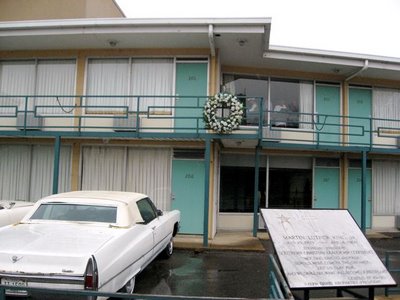
The Lorraine Hotel, Memphis TN, taken by David I on 1/13/07.
Compare:
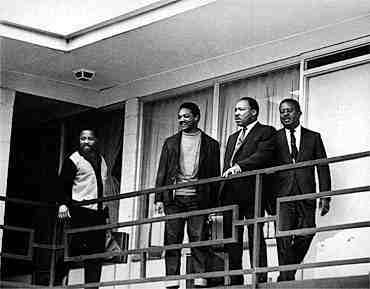
Technorati Tags: Freedom, Picture>1kwords
Wednesday, January 10, 2007
Apple blows it
Second mistake: it'll be a closed platform. Third party apps will be extremely limited. Jobs does have good intuition about how things should be done, for sure. But is he smarter than his customers? Suppose, for example, some third party figures out a more elegant, zero-cost VOIP/Wi-Fi communications suite, a Skype on steroids. Could Apple's usual delightful design redeem it.
I guess there's a chance that iPod will be un-shackled in the rest of the GSM world. But if Apple was going for the open, global play, why'd they announce the closed, U.S. deal first?
It is of more than passing interest that Apple chose Cingular mere days after the AT&T-BellSouth merger brings Cingular under monolithic control. Big questions remain . . .
Technorati Tags: Apple, Cellco, WalledGardens
Labels: Apple, Cingular, iPhone
Monday, January 08, 2007
Announcing F2C: Freedom to Connect
March 5 & 6, Washington, DC
http://freedom-to-connect.net
Special price in effect this week only, $250, expires 9:00 PM on 1/15/07.
F2C: Freedom to Connect is the isen.com gathering of SMART People to discuss the infrastructure of the Internet and all that it enables. F2C's theme-setting speaker this year is Yochai Benkler, whose 2006 book, _The Wealth of Networks_, is the most important book I've read recently. Benkler intimates that we're underestimating the long-term impact of the Internet. Specifically, he says, open source software, Wikipedia and Second Life are signals of a future where large-scale networked cooperation becomes as important a means of production as industry and marketplace. At F2C, we'll explore this hypothesis, the evidence pro and con, the scenarios that it suggests for a transformed future, and some other scenarios that may obtain if Benkler's hypothesis doesn't pan out. And we'll attempt to discern additional clues to our networked future from current movement in technology, policy, business and economics.
The early list of committed speakers to F2C includes Mark Cooper, Susan Crawford, Dan Gillmor, Mary Hodder, Reed Hundt, Jonathan Krim, Blair Levin, Cory Ondrejka, Gigi Sohn and David Weinberger (in addition to Benkler). This early list is UNDER CONSTRUCTION -- more additions are imminent.
The special rate of $250, for very early birds, expires in one week . . . a word to the SMART.
I hope to see you at F2C: Freedom to Connect! -- David I
Technorati Tags: Conferences, F2C, F2C2007
Sunday, January 07, 2007
Quote of Note: Patrick Ross
Patrick Ross, blogging from Consumer Electronics Show.
Technorati Tags: Press, QuoteOfNote, Scotus
Labels: CES, QuoteofNote, SCOTUS
Thursday, January 04, 2007
Picture >1k Words
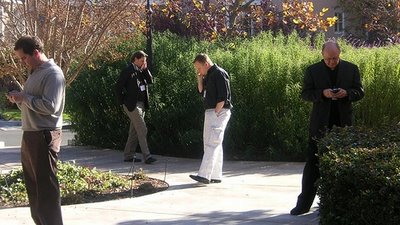
Social Media by Deb Schultz, reproduced here because Deb grants a CC attribution non-commercial license.
Technorati Tags: Picture>1kwords
Quote of Note: George W. Bush
George W. Bush, in signing statement for H.R. 6407, the "Postal Accountability and Enhancement Act," December 20, 2006
Technorati Tags: Bushco, Constitution, Democracy, Freedom, Privacy
Verizon on Net Neutrality, NYC
Time: 6:00 p.m.
Location: James B.M. McNally Amphitheatre, Fordham Law School
Sponsor: Fordham Center for Law and Information Policy
The Honorable William Barr will present the inaugural lecture for the CLIP Law and Information Society Lecture Series on Net Neutrality. William Barr is Executive Vice President and General Counsel for Verizon and was formerly the United States Attorney General.
Registration required. Register here. See you there.
Technorati Tags: NetworkNeutrality, Verizon
Wednesday, January 03, 2007
Did strong intellectual property rules protect Whitney Houston?
Technorati Tags: intellectualproperty
2007: The Year of the Open Cell Phone?
(To me, an Open Cell Phone means simply that the applications are not provided or gate-kept by the connection provider.)
We'll know we're there if there's as much buzz around mobile apps next December as there is around video now. If I were offered a bet on this, I'd probably keep my money in my pocket.
Technorati Tags: 2007, Apple, Cellco, End-to-End
2007: The Year of Video for Learning
Technorati Tags: AT&T, BellSouth, NetworkNeutrality, 2007, video
Lots of Good Press on Merger Conditions
Technorati Tags: AT&T, BellSouth, NetworkNeutrality
